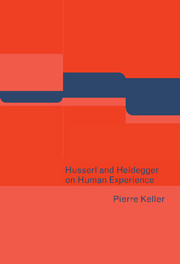Book contents
- Frontmatter
- Contents
- Introduction
- 1 Experience and intentionality
- 2 Husserl's methodologically solipsistic perspective
- 3 Husserl's theory of time-consciousness
- 4 Between Husserl, Kierkegaard, and Aristotle
- 5 Heidegger's critique of Husserl's methodological solipsism
- 6 Heidegger on the nature of significance
- 7 Temporality as the source of intelligibility
- 8 Heidegger's theory of time
- 9 Spatiality and human identity
- 10 “Dasein” and the forensic notion of a person
- Select bibliography
- Index
1 - Experience and intentionality
Published online by Cambridge University Press: 02 November 2009
- Frontmatter
- Contents
- Introduction
- 1 Experience and intentionality
- 2 Husserl's methodologically solipsistic perspective
- 3 Husserl's theory of time-consciousness
- 4 Between Husserl, Kierkegaard, and Aristotle
- 5 Heidegger's critique of Husserl's methodological solipsism
- 6 Heidegger on the nature of significance
- 7 Temporality as the source of intelligibility
- 8 Heidegger's theory of time
- 9 Spatiality and human identity
- 10 “Dasein” and the forensic notion of a person
- Select bibliography
- Index
Summary
In this chapter, I concern myself with developments in the theory of intentionality from Aristotle to the present. These developments provide the background against which Husserl's and Heidegger's accounts of experience may be understood. My intention is to flesh out competing pulls in the notion of intentionality that provide the basis for fundamental disagreements about the nature and the status of intentionality and the role of intentionality in understanding human experience. The competing pulls inherent in the notion of intentionality are crucial to understanding Husserl's account of intentionality in his Logical Investigations and more generally to understanding what is at issue between Husserl and Heidegger when it comes to understanding the fundamental nature of experience.
Both Husserl and Heidegger come to an understanding of experience from the role of intentionality in experience. Husserl makes important modifications in Brentano's account of intentionality which determine the character of his conception of experience. Heidegger later reaches back behind Brentano's appropriation of Aristotle's conception of intentionality and attempts to provide a radically new account of intentionality which undermines the subjectivist tendency implicit in both Brentano's and Husserl's account of experience.
The notion of intentionality has its source in the Aristotelian conception of soul as a source of life and cognition. For Aristotle, the soul is a functional unity that is characterized in the case of animals and human beings by a capacity for experience and cognition. This capacity for experience and cognition is, in turn, based on more specific functional subsystems of the functional unity that is the soul.
- Type
- Chapter
- Information
- Husserl and Heidegger on Human Experience , pp. 15 - 38Publisher: Cambridge University PressPrint publication year: 1999

